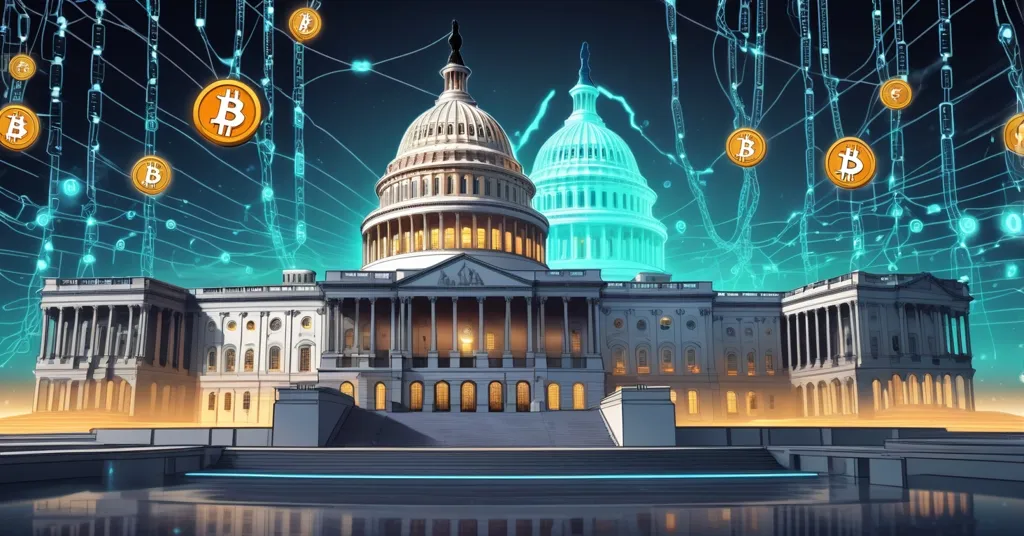U.S. Crypto Week: Bitcoin Boost or Trump Controversy? Legislation Sparks Hope and Debate

Champagne on Ice: America’s Crypto Week Sparks Hope and Controversy for Bitcoin and Blockchain
The U.S. House of Representatives has launched into ‘Crypto Week,’ a historic series of votes on cryptocurrency legislation that could reshape the future of Bitcoin and digital assets under President Donald Trump’s pro-crypto stance. This isn’t just a political maneuver—it’s a defining moment that could either propel blockchain into the financial mainstream or bog it down in cronyism and half-baked rules. With legislative milestones on the table and controversies swirling around Trump’s personal ventures, there’s plenty to celebrate and scrutinize as we navigate this pivotal juncture.
- Historic Legislation: Three bills—GENIUS Act (stablecoin regulation), CLARITY Act (market structure), and Anti-CBDC Surveillance State Act (CBDC ban)—are up for votes, with GENIUS likely heading to Trump’s desk.
- Political Tensions: Republicans cheer the end of uncertainty, while Democrats warn of regulatory gaps and looming crises.
- Dark Shadows: Trump-linked projects like World Liberty Financial (WLF) and $TRUMP memecoin, plus Binance’s murky ties, raise ethical red flags.
Legislative Milestones: A New Era for Bitcoin and Blockchain?
As ‘Crypto Week’ takes center stage, the House is poised to vote on three transformative bills that could provide long-overdue clarity for the crypto space. Kicking things off is the GENIUS Act, a bill focused on regulating stablecoins—digital tokens pegged to assets like the U.S. dollar to maintain a steady value (think of them as digital cash, unlike Bitcoin’s rollercoaster prices). With a market cap of $238 billion, stablecoins such as Circle’s USDC and Tether’s USDT are critical on-ramps for Bitcoin and altcoin trading, making their regulation a cornerstone for mainstream adoption. Already passed by the Senate with bipartisan support in June, the GENIUS Act is expected to clear the House by Thursday and reach Trump’s desk for a signature—a move he’s demanded without any changes. For more on the significance of this event, check out the coverage of America’s Crypto Week kicking off.
Following closely is the CLARITY Act, scheduled for a Wednesday vote, which aims to establish a structured framework for crypto markets. This means defining how digital assets are classified, who can participate, and which regulators oversee the game—a desperately needed rulebook after years of ambiguity that’s stifled innovation for Bitcoin and beyond. Then there’s the Anti-CBDC Surveillance State Act, set to ban central bank digital currencies (CBDCs). For the uninitiated, CBDCs are government-issued digital money that many in the Bitcoin community fear could enable mass surveillance—imagine every transaction tracked by bureaucrats, unlike Bitcoin’s pseudonymous shield. While its exact voting date remains unclear, its presence in ‘Crypto Week’ underscores a fierce ideological clash between decentralization and state control, a fight we staunchly back on the side of freedom. Learn more about the broader context of cryptocurrency legislation in the U.S. and beyond.
House Republicans, spearheaded by Reps French Hill (R-AR) and Glenn Thompson (R-PA), are already toasting to a crypto-friendly future. In a joint op-ed published in The Hill, they proclaimed:
“The days of regulatory uncertainty are coming to an end.”
Their enthusiasm rests on the belief that these bills will legitimize Bitcoin as digital gold and provide a sandbox for altcoins and blockchain projects to thrive. After debacles like the 2022 FTX collapse and endless regulatory ping-pong, a stable foundation could indeed turbocharge adoption. Analysts like Nic Puckrin from Coin Bureau echo this optimism, predicting the GENIUS Act could unleash a flood of new stablecoin issuers—even major banks—while cementing the U.S. dollar’s dominance, given 99% of stablecoins are USD-pegged. That’s a potential win for Bitcoin as a reserve asset paired with trusted stablecoin on-ramps. Dive deeper into the specifics of the GENIUS Act and its potential impact on the market.
Political Divide: Clarity or Catastrophe?
Not everyone’s buying the hype. Democrats, led by Reps Maxine Waters (D-CA) and Stephen Lynch (D-MA), have branded ‘Crypto Week’ as “Anti-Crypto Corruption Week,” slamming the bills as dangerously incomplete. Waters issued a stark warning:
“America will eventually face its first crypto financial crisis.”
A detailed notice from House Democrats on the GENIUS Act doubles down, pointing out glaring oversights:
“There are no community reinvestment requirements, no third-party vendor federal oversight, and weak federal oversight of stablecoin issuers licensed by states or overseas.”
Sen. Jeff Merkley (D-Ore.) piled on, highlighting the risk of officials profiting from favored stablecoins—a not-so-subtle jab at Trump’s personal stakes. Their argument is simple: these laws are like building a skyscraper without a foundation, inviting disaster. Yet, despite the sharp criticism, Democratic opposition lacks the cohesion to halt the bills, especially with Trump’s ironclad influence over GOP lawmakers, who’ve blocked amendments addressing presidential crypto holdings. It’s a power play that’s hard to ignore. For a broader perspective on the legislative push and its impact on crypto, the details are worth exploring.
On the flip side, voices like Sen. Bill Hagerty (R-Tenn.) counter that without stablecoin regulation, the U.S. risks losing its edge to overseas competitors. He argues that bills like GENIUS are essential to keep blockchain innovation domestic—a sentiment many Bitcoin maximalists share, even if the execution’s messy. Bezalel Eithan Raviv, CEO of Lionsgate Network, takes a pragmatic “let’s give it a shot” stance, embodying the effective accelerationism (e/acc) philosophy we resonate with: push forward, flaws be damned, because stagnation kills progress faster than imperfect laws ever could. Still, the Democratic warnings linger—are we sprinting toward clarity or a cliff? Community discussions on platforms like Reddit highlight varied opinions on Trump’s influence over stablecoin regulation.
Trump’s Crypto Conflicts: A Stain on Decentralization?
President Trump’s role in ‘Crypto Week’ extends far beyond policy advocacy—his personal crypto ventures are casting a long shadow over the proceedings. Take World Liberty Financial (WLF), a DeFi project where Trump recently slashed his stake from 60% to 40% (per fine print on their site). DeFi, for the unversed, stands for decentralized finance—platforms built on blockchain to offer banking services without middlemen, ideally with full transparency. Yet WLF is anything but transparent. A $100 million purchase of its WLFI tokens by the obscure UAE-based Aqua1 Foundation has raised serious questions. Journalist Jacob Silverman, investigating for The Nation, put it bluntly:
“How [can] a 30-year-old Chinese-Brazilian finance professional working for a Chinese state energy company secure $100 million to buy crypto tokens from the President of the United States’ main crypto firm?”
Silverman pinpointed a co-founder of Aqua1, David Li (aka Dave Lee), linked to Hong Kong’s Web3Port and the Chinese National Petroleum Corporation. Blockchain data confirms at least $80 million in USDT flowed to WLF, and Li’s LinkedIn vanished after Silverman reached out. Add in a $2 billion deal for WLF’s USD1 stablecoin with UAE’s government-linked MGX Investment Firm, and the geopolitical stench is undeniable. For those of us championing Bitcoin’s trustless ethos, this kind of centralized, shady dealing is a slap in the face to decentralization. Uncover more about the WLF token purchase and ties to David Li in this detailed investigation.
Then there’s the $TRUMP memecoin, launched in January and hyped directly by Trump on social media. Memecoins are often little more than digital hype machines, fueled by memes or celebrity clout rather than real utility. This one’s a goldmine—raking in over $172 million in trading fees thanks to lightning-fast listings on major exchanges (averaging just 4 days compared to 129 for peers). Bitget CEO Gracy Chen casually dismissed compliance worries with:
“The fact that Trump announced the token’s launch on his social media accounts should kind of solve the compliance issue.”
Seriously? That’s the standard now? With another 50.5 million tokens worth $475 million unlocking on July 18, and TRON founder Justin Sun planning to buy $100 million more, this screams speculative mania. No sugarcoating here: this isn’t the kind of adoption Bitcoin needs—it’s a sideshow of greed that risks tainting the entire space with pump-and-dump vibes. Real progress comes from utility, like Bitcoin’s censorship resistance, not gimmicky tokens. Explore the ongoing debates surrounding Trump’s controversial crypto ventures like WLF for additional context.
Binance in the Crosshairs: Centralized Power Under Fire
The controversies don’t stop with Trump. Binance, the world’s largest crypto exchange, is catching heat for allegedly creating and promoting WLF’s USD1 stablecoin. According to Bloomberg, over 90% of these tokens sit in Binance wallets, generating interest for WLF, tied to that $2 billion MGX deal. Binance founder Changpeng ‘CZ’ Zhao, currently seeking a Trump pardon for a 2023 anti-money laundering conviction, fired back, calling the report a “hit piece” full of errors and suggesting competitor sabotage (Coinbase denies involvement). Whether CZ’s protests hold water or not, this raises glaring concerns about centralized exchanges meddling in politically charged projects. Bitcoin was built to ditch middlemen, not watch them play stablecoin puppetmaster. These entanglements only reinforce why decentralization must remain our north star. Get the latest updates on the Binance USD1 stablecoin controversy with WLF for a deeper look.
TradFi Meets Blockchain: A Bridge for Bitcoin and Stablecoins
Amid the political and speculative noise, a quieter revolution is brewing: traditional finance (tradfi) is warming to blockchain. The U.S. Federal Reserve, OCC, and FDIC recently issued joint guidance for banks on crypto custody, stressing robust risk management and key security to prevent permanent asset loss. This isn’t just red tape—it’s a green light for banks to safekeep digital assets, bridging Bitcoin’s decentralized roots with Wall Street’s infrastructure. Meanwhile, stablecoin giants like Ripple Labs (issuer of RLUSD) and Circle are pursuing national bank charters to self-custody their fiat reserves, currently held by BNY Mellon. Progress is sluggish, but success could legitimize stablecoins as blockchain-based payment tools—a niche Bitcoin doesn’t aim to fill, nor should it, as digital gold.
This convergence could be a game-changer. Stablecoin clarity via the GENIUS Act might boost user trust, making Bitcoin a safer hedge for everyday investors pairing it with stable assets. Altcoin ecosystems like Ethereum could also benefit under the CLARITY Act, with smart contracts thriving on defined rules, filling gaps Bitcoin leaves open. Yet, regulatory hurdles persist—bank charters aren’t handed out overnight, and weak oversight in these bills could invite exploitation. It’s a tightrope walk between mainstreaming blockchain and preserving its disruptive edge. For insights into the broader impact of stablecoin regulation on Bitcoin, community perspectives offer diverse views.
Bitcoin’s Stake: Golden Ticket or Gilded Cage?
So, what does ‘Crypto Week’ mean for Bitcoin specifically? On one hand, stablecoin regulation could solidify BTC’s role as a reserve asset—think of trusted stablecoins as the perfect sidekick for hedging volatility, drawing more normies into the fold. The CBDC ban aligns with maximalist values, protecting privacy and freedom from state overreach, a core reason many of us hold Bitcoin dear. Clear market rules under the CLARITY Act might also reduce scams, indirectly boosting Bitcoin’s credibility as the OG crypto.
But there’s a flip side. Rushed legislation with inadequate guardrails risks centralizing power—be it through politically influenced stablecoin issuers or exchanges like Binance wielding outsized control. Trump’s conflicts of interest could taint policy, turning a potential win into a tool for personal gain. And let’s not forget past U.S. policy flops—think SEC’s inconsistent crackdowns or the endless Ripple XRP lawsuit. History warns us that good intentions don’t guarantee good outcomes. We’re all for accelerating this financial revolution, but not at the cost of Bitcoin’s trustless soul.
Key Takeaways and Questions on Crypto Week’s Impact
- What’s the significance of ‘Crypto Week’ for Bitcoin and blockchain?
It’s a landmark push for U.S. legislation on stablecoins, market structure, and CBDC bans, potentially legitimizing Bitcoin’s ecosystem and altcoin innovation, though it risks overreach or political skew. - How is Trump shaping crypto policy, and at what cost?
His drive for the GENIUS Act and sway over GOP lawmakers prioritize speed, but his ties to WLF and $TRUMP raise conflict-of-interest fears that could undermine fair policy for decentralized tech. - Why the backlash over World Liberty Financial and $TRUMP memecoin?
WLF’s $100 million deal with a dubious UAE fund tied to Chinese state interests, and $TRUMP’s speculative frenzy with rapid exchange listings, spotlight ethical and transparency crises in DeFi and memecoins. - What’s behind Binance’s involvement with WLF?
Allegations of crafting WLF’s USD1 stablecoin and profiting from stored funds clash with CZ’s denials, exposing centralized exchange flaws that Bitcoin’s decentralization seeks to eliminate. - How are banks integrating with crypto, and what’s the upside?
New custody guidance and charter bids by Ripple and Circle signal tradfi’s embrace of blockchain, potentially mainstreaming stablecoins as payment tools alongside Bitcoin’s store-of-value strength. - Does this legislation truly champion decentralization?
Only partly—clarity could spur adoption, but weak oversight and political meddling risk consolidating power, a trend Bitcoin maximalists must resist to preserve privacy and freedom.
As ‘Crypto Week’ unfolds, the potential for Bitcoin and blockchain to redefine finance hangs in the balance. Stablecoins could become payment staples, market rules might curb chaos, and a CBDC ban could safeguard our liberties. Yet, the specter of Trump’s conflicts, speculative memecoin nonsense, and centralized exchange overreach looms large. We’re rooting for a decentralized future that prioritizes freedom over political games or profiteering, but vigilance is key. Will this be Bitcoin’s golden ticket or a gilded cage? Time—and our relentless push for transparency—will tell.



